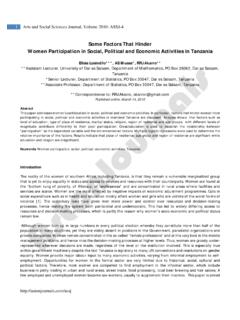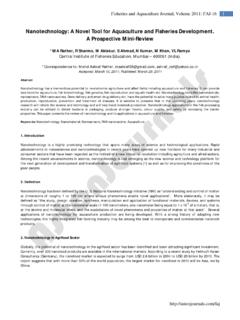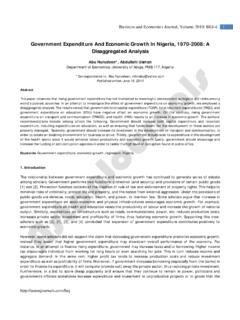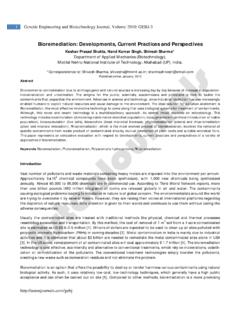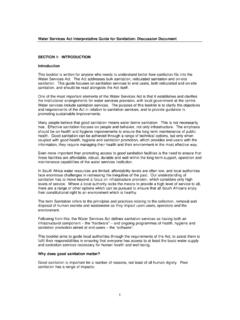Transcription of Empirical Study of the Effect of Conflict on ...
1 1 Business and Economics Journal, Volume 2010: BEJ-15 Empirical Study of the Effect of Conflict on organizational performance in Nigeria 1O M Hotepo, 2A S S Asokere, *I A Abdul-Azeez1, 2S S A Ajemunigbohun 1 Department of Business Administration and Management Technology; 2 Department of Accounting and Finance; Lagos State University, 0001, LASU Post Office Ojo, Lagos, Nigeria *Correspondence to: I A Abdul-Azeez, Accepted: September 7, 2010; Published online: October 28, 2010 Abstract The purpose of this Study is to investigate the Effect of organizational Conflict on organizational performance . This was carried out by investigating the causes, types, reason and strategies for managing conflicts in some selected service organizations in Nigeria, with a view of coming out with ways of improving their performance and productivity.
2 The Study employs descriptive research design and uses questionnaire to collect data from 96 managers in some selected Airlines, Road Transport and Insurance companies in Lagos Metropolis. The research revealed that limited resources is the major cause of Conflict and that conflicts have both negative and positive effects on organization, but when managed properly, the positive effects can be used to encourage organizational innovativeness and build cooperation among the employees. Keywords: Conflict ; Organization; performance ; Effect ; Nigeria. 1. Introduction conflicts are inevitable part of organizational life since the goals of different stakeholders such as managers and staff are often incompatible [1]. Conflict is an unpleasant fact in any organization as longer as people compete for jobs, resources, power, recognition and security.
3 organizational Conflict can be regarded as a dispute that occurs when interests, goals or values of different individuals or groups are incompatible with each other [2]. This results into a situation whereby they frustrate each other in an attempt to achieve their objectives. Conflict arises in groups because of the scarcity of freedom, position, and resources. People who value independence tend to resist the need for interdependence and, to some extent, conformity within a group. People who seek power therefore struggle with others for position or status within the group. Conflict is a part of organizational life and may occur between individuals, between the individual and the group, and between groups [3]. While Conflict is generally perceived as dysfunctional, it can also be beneficial because it may cause an issue to be presented in different perspectives.
4 Conflict has both positive and negative effects [4]. It can be positive when it encourages creativity, new looks at old conditions, the clarification of points of view, and the development of human capabilities to handle interpersonal differences. Conflict can be negative when it creates resistance to change, establishes turmoil in organization or interpersonal relations, fosters distrust, builds a feeling of defeat, or widens the chasm of misunderstanding. Unfortunately, the term " Conflict " has only the connotation of "bad" for many people; so much so that they think principally in terms of suppression, giving little or no attention to its more positive side. Rico [5] emphasizes this by stating that it seems entirely likely that many, if not most, organizations need more Conflict , not less.
5 Pondy [6] also stated that the absence of Conflict may indicate autocracy, uniformity, stagnation, and mental fixity; the presence of Conflict may be indicative of democracy, diversity, growth, and self-actualization. Tjosvold [7] complements this statement arguing that Conflict is not the opposite of cooperation but a mechanism that allows to perceive benefits of cooperative work. Furthermore, Conflict is considered psychologically and socially healthy. It is psychologically healthy because it provides a breather for frustrations and enables a feeling of participation and even of joy. And it is sociable healthy because it encourages opposition to the status quo and provides conditions for social chances and democracy stemming from pluralism and respect to diversity.
6 Therefore, according to [8], Conflict is ubiquitous, not necessarily dysfunctional and can be required to defy people to perform and stimulate progress. This research studied the Effect of Conflict management on organizational performance by using managers of hotels, airlines, road transport and insurance companies in Lagos. It investigates the personal characteristics of the respondents, their views about Conflict in the service industry, categories of staff they have experienced conflicts with, types of conflicts experienced, reasons for E-ISSN: 21516219 2 Research Article conflicts , sources of organizational conflicts , factors that have caused conflicts in service industry, as well as strategies for managing organizational conflicts to improve organizational performance and productivity.
7 The significance of this Study lies in the fact that its finding will enable managers in service industry have in depth knowledge of causes of Conflict and how to manage Conflict in service industry not only in Nigeria but across the world. The Study aims at generating data that will enhance the understanding of Conflict and how it is been managed in Nigerian service industry. Types of organizational Conflict Ikeda et al [9] observed that organizational Conflict involves interpersonal conflicts with colleagues or supervisors, or intergroup conflicts within different sections of an organization. There are two essential types of Conflict in organizations: vertical and horizontal [10]. Vertical Conflict occurs in groups of different hierarchical levels, such as supervisors and salesmen, whereas horizontal Conflict occurs between individuals of the same level, such as managers in the same organization.
8 In the vertical Conflict , differences in status and power between groups are in general larger than in the horizontal Conflict [11] because these aspects tend to equalize in equivalent hierarchical levels. When vertical Conflict takes place between operational workers and administration, their sources refer to: (i) psychological distance: workers don t feel involved in the organization and feel that their needs are not met; (ii) power and status: workers feel powerless and alienated; (iii) differences in value and ideology: this difference represents underlying beliefs on objectives and goals of an organization and; (iv) scarce resources: disagreements regarding benefits, salary and work conditions. In vertical Conflict , apparently individuals in lower organizational level seek to avoid conflicts with higher hierarchical levels [12].
9 Pondy [6] observed that it is expected that the top management peers perceive more Conflict internally between their groups than those of lower position. This happens because of the following reasons: (i) people in higher hierarchical level, rather than the lower ones, are engaged in non-routine activities and development of politics, where orientation for the actions are less clear and chances for disagreement, bigger and; (ii) people in higher hierarchical level, rather than the lower ones, are probably less flexible in their points of view. Hence Conflict resolution is more difficult. Considering the vertical Conflict [10], research examines the short-term and long-term effects of perceived fairness in organizational conflicts between employees and supervisors. The authors concluded that employees fairness is important in the resolution of organizational conflicts .
10 When employees realize that there was fairness in the Conflict resolution, the bond between the group strengthens. The authors added that the perceived and distributive fairness significantly enhances job satisfaction, positive organizational commitment and satisfaction with outcome of conflicts . Causes of organizational conflicts In any organization, there are many causes of conflicts ; however, conflicts within an individual usually arise when a person is uncertain about what task is expected to do, if not clearly defined by the supervisor or the person in charge [2]. Furthermore, if the tasks of individuals working as a group are not clearly defined by the management they will lead to more conflicts . conflicts between individuals may result from role-related pressures.
